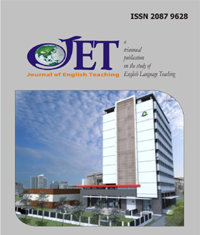An Overview of the Study of Language in the History of Philosophy (Renaissance to Postmodern)
DOI:
https://doi.org/10.33541/jet.v9i1.4602Keywords:
deconstruction, language study, linguistic turn, philosophyAbstract
To English educators and researchers, having a good grasp of what a language is and how language learning takes place is important. To a certain extent, surveying language study development is a good start to achieving the goal. This article is the second part of a literature review summarizing language studies taking place along the history of philosophy that has lasted for 26 centuries, starting from ancient Greek to the postmodern era. This part includes language studies conducted in Renaissance Period up to the Postmodern Age. Data was collected by surveying relevant and credible textbooks and scientific articles. The findings reveal that unlike language studies in Ancient Greek up to the Middle Ages that focused on various paradigms related to the nature of language and micro-linguistic concepts, the studies in the era of modern philosophy focus on the relationship between language and users and the world. Overall, the changes in the focus of language studies over the 26 centuries indicate that the study of language will keep on going on and on because language is a symbiotic organism that continues to change along with the changes in thinking, experience, life, and human culture as the host of the symbiosis between language and humans.
References
Aitchison, J. (1998). ‘A blueprint in the brain? in The articulate mammal: An introduction to psycholinguistics, 109-29, London and New York: Routledge.
Anderson, J. R. (2005). Human symbol manipulation within an integrated cognitive architecture. Cognitive Science, 29, 313–342.
Azhar, I.N. (2020). Peranan Filsafat Dalam Mengembangkan Linguistik. Pamator, 3(1), 25-39.
Bac, L.H. & Hang, D.T.T. (2016). From Language to Postmodern Language Game Theory. Mediterranean Journal of Social Sciences, 7(6), 319-324.
Barker, C. (2004). Cultural studies:
Theory and practice. London: SAGE Publications.
Barthes, R. (1977). The death of the author. London: Fontana.
Borgman, A. (1974). The philosophy of language. Nederland: Martinus Nijhoff— The Hague
Caputo, J. D. (2018). Hermeneutics: Facts and interpretation in the age of information. London: Pelican Books.
Caputo, J. D. (1997). Deconstruction in a nutshell: A conversation with Jacques Derrida. New York: Fordham University Press.
Chomsky, N. (1958). Review of B. F. Skinner’s Verbal Behavior. Retrieved 2 September 2022 from: https://www.marxists.org/reference/subject/philosophy/works/us/ chomsky-skinner.htm
Derrida, J. (1976). Of grammatology. Baltimore: Johns Hopkins University Press.
Driem, G.V. (2004), Language as OrganismL A Brief Introduction to the Leiden Theory of Language Evolution. Studies on Sino-Tibetan Languages, 1-9
Godart-Wendling, B. (2020). History of Analytic Philosophy of Language. Oxford Research Encyclopedias, Linguistics. https://doi.org/10.1093/acrefore /97801993846 55.013.446
Harmer, J. (2001). The practice of English language teaching. 3rd Ed.). Longman Pearson Education Limited.
Jiliang, T. (2001). The Place of the Philosophy of Language in Modern Western Philosophy. Contemporary Chinese Thought, 32:3, 46-57
Kaelan, M.S. (2013). Pembahasan filsafat bahasa. Penerbit Paradigma
Kant, I. (1784). What is enlightenment? Retrieved 9 September 2022 from http://www.columbia.edu/acis/ets/CCREAD/etscc/kant.html
Kargar, A.A. (2012). The Ecology of First Language Acquisition Nativism and Empiricism: An Appraisal and a Compromise. Journal of Language Teaching and Research, 3(5), 868-875. DOI: 10.4304/jltr.3.5.868-875
Kestel, M. & Korkmaz, I. (2019). The Impact of Modernism and Postmodernism on Teachers. Turquoise International Journal of Educational Research and Social Studies, 1(1), 28-33
Losonsky, M. (2006). Linguistic turns in modern philosophy, New York: Cambridge University Press
Lust, C.B. 2006. Child language acquisition and growth. Cambridge: Cambridge University Press
Lyotard, J. F. (1984). The Postmodern condition: A report on knowledge, Manchester: Manchester University Press
MacWhinney, B. (1998). Models of the Emergence of Language. Annual Review of Psychology. 49, 199-227
Matar, A. (2006). Modernism and the language of philosophy. Ney York: Taylor & Francis
McHale, B. (1992). Constructing postmodernism. London/New York: Routledge.
New World Encyclopedia. (n, d,). Post Structuralism. Accessed October 2022 from: https://www.newworldencyclopedia.org/entry/Post-structuralism
Pardede, P. (2022). An Overview of the Study of Language in the History of Philosophy (Ancient Greek to Medieval Age). Journal of English Teaching, 8(3), 432-443. DOI: https://doi.org/10.33541/jet.v8i3.4598
Plunkett, K. & Wood, C. (2004) ‘The development of children’s understanding of grammar', in Oates, J. and Grayson, A. (eds). Cognitive and language development in children. Oxford: Blackwell/The Open University.
Russell, B. (2010). The philosophy of logical atomism. London: Routledge
Saussure, D. F. Culler, D. J; Balley. C; Sechehave, A; Baskin, W. (1974). Course in General Linguistics. London: Fotana: Collins.
Slater, A. & Oates, J. (2005). Sensation to perception, in Oates, J. Wood, C & Greyson, A. (eds) Psychological Development and Early Childhood. Oxford: Blackwell/The Open University
Teague, D.P. (n.d.) An Introduction to Postmodern Philosophy. Postmodern Preaching. Retrieved 10 September 2022 from: https://www.postmodernpreaching. net/ postmodern-philosophy.html
Tranfield, D., Denyer, D., & Smart, P. (2003). Towards a methodology for developing evidence-informed management knowledge by means of systematic review. British Journal of Management, 14, 207–222. https://doi.org/10.1111/1467-8551.00375
Veerachary, P. (2018). Philosophical Dimensions of Postmodernism. International Journal of Humanities and Social Science Invention (IJHSSI), 7(5), 32-37
Webster, J., & Watson, R. T. (2002). Analyzing the past to prepare for the fu a literature review. Management Information Systems Quarterly, 26, 3
Wittgenstein, L. (2001). Tractatus logico-philosophicus. Trans. by D. F. Pears and B. F. McGuinness. New York: Routledge.
Wittgenstein, L. (1986). Philosophical investigations. Trans. by G.E.M. Anscombe. Oxford: Basil Blackwell Ltd.
Downloads
Published
Issue
Section
License
Copyrights for articles published in JET are retained by the authors, with first publication rights granted to the journal. The journal/publisher is not responsible for subsequent uses of the work. It is the author's responsibility to bring an infringement action if so desired by the author.



